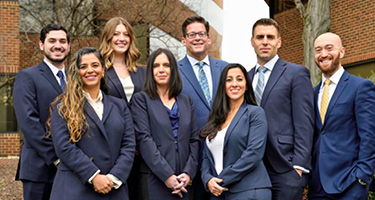Insights
The Future of Family Law: 3 Top Trends Driving the Field
by Gregory Sirico
How technology, mental health awareness and alternative dispute resolution are transforming family law to better support evolving family dynamics.
Read Full Article

2025 Best Lawyers Awards Announced: Honoring Outstanding Legal Professionals Across the U.S.
by Jennifer Verta
Introducing the 31st edition of The Best Lawyers in America and the fifth edition of Best Lawyers: Ones to Watch in America.

Unveiling the 2025 Best Lawyers Awards Canada: Celebrating Legal Excellence
by Jennifer Verta
Presenting the 19th edition of The Best Lawyers in Canada and the 4th edition of Best Lawyers: Ones to Watch in Canada.

Discover The Best Lawyers in Spain 2025 Edition
by Jennifer Verta
Highlighting Spain’s leading legal professionals and rising talents.

Unveiling the 2025 Best Lawyers Editions in Brazil, Mexico, Portugal and South Africa
by Jennifer Verta
Best Lawyers celebrates the finest in law, reaffirming its commitment to the global legal community.

Presenting the 2025 Best Lawyers Editions in Chile, Colombia, Peru and Puerto Rico
by Jennifer Verta
Celebrating top legal professionals in South America and the Caribbean.

Prop 36 California 2024: California’s Path to Stricter Sentencing and Criminal Justice Reform
by Jennifer Verta
Explore how Prop 36 could shape California's sentencing laws and justice reform.

Tampa Appeals Court ‘Sends Clear Message,” Ensuring School Tax Referendum Stays on Ballot
by Gregory Sirico
Hillsborough County's tax referendum is back on the 2024 ballot, promising $177 million for schools and empowering residents to decide the future of education.

Find the Best Lawyers for Your Needs
by Jennifer Verta
Discover how Best Lawyers simplifies the attorney search process.

Paramount Hit With NY Class Action Lawsuit Over Mass Layoffs
by Gregory Sirico
Paramount Global faces a class action lawsuit for allegedly violating New York's WARN Act after laying off 300+ employees without proper notice in September.

The Human Cost
by Justin Smulison
2 new EU laws aim to reshape global business by enforcing ethical supply chains, focusing on human rights and sustainability

The Future of Family Law: 3 Top Trends Driving the Field
by Gregory Sirico
How technology, mental health awareness and alternative dispute resolution are transforming family law to better support evolving family dynamics.

Introduction to Demand Generation for Law Firms
by Jennifer Verta
Learn the essentials of demand gen for law firms and how these strategies can drive client acquisition, retention, and long-term success.

Social Media for Law Firms: The Essential Beginner’s Guide to Digital Success
by Jennifer Verta
Maximize your law firm’s online impact with social media.

ERISA Reaches Its Turning Point
by Bryan Driscoll
ERISA litigation and the laws surrounding are rapidly changing, with companies fundamentally rewriting their business practices.

Why Mobile Optimization for Legal Websites Is Essential
by Jamilla Tabbara
Mobile optimization helps law firms build credibility, connect with clients and improve digital marketing.

Best Lawyers Legal Publications: Elevating Your Law Firm Through Targeted Print Marketing
by Jamilla Tabbara
Legal publications help law firms leverage print marketing to build credibility, connect with clients and stand out.

Best Lawyers: The Ultimate Legal Directory Option
by Jamilla Tabbara
How the right legal directory option can drive trust and growth.

How to Integrate Digital and Traditional Media for Law Firms
by Jamilla Tabbara
Bridge the gap between traditional and digital media to strengthen your law firm’s marketing approach.

The Future of Family Law: 3 Top Trends Driving the Field
by Gregory Sirico
How technology, mental health awareness and alternative dispute resolution are transforming family law to better support evolving family dynamics.

New Mass. Child Custody Bills Could Transform US Family Law
by Gregory Sirico
How new shared-parenting child custody bills may reshape family law in the state and set a national precedent.

Family Law Wrestles With Ethics as It Embraces Technology
by Michele M. Jochner
Generative AI is revolutionizing family law with far-reaching implications for the practice area.

Struggling to Attract Clients? Discover Small Law Firm Marketing Strategies That Work
by Jennifer Verta
Recognize what is holding your law firm back.

Safe Drinking Water Is the Law, First Nations Tell Canada in $1.1B Class Action
by Gregory Sirico
Canada's argument that it has "no legal obligation" to provide First Nations with clean drinking water has sparked a major human rights debate.

7 Key Steps to Successful Social Media Campaigns for Lawyers
by Jamilla Tabbara
Effective strategies to boost your law firm’s social media presence and client engagement.

The Future of Canadian Law. Insights from Best Lawyers: Ones to Watch Honorees
by Jennifer Verta
Emerging leaders in Canada share their perspectives on the challenges and opportunities shaping the future of Canadian law

Breaking Down Bar Association Compliance in Legal Marketing
by Jamilla Tabbara
Ensure your legal marketing practices meet ABA compliance standards to build trust, attract clients and avoid penalties.

Paramount Hit With NY Class Action Lawsuit Over Mass Layoffs
by Gregory Sirico
Paramount Global faces a class action lawsuit for allegedly violating New York's WARN Act after laying off 300+ employees without proper notice in September.

IN PARTNERSHIP
Benefits of Hiring an Attorney After a Car Accident
by Michael Hall III
Car accidents can cause life-altering injuries and financial setbacks. Hire a car accident attorney to stay prepared.

IN PARTNERSHIP
Understanding How Car Accident Lawyers Work on Your Case
by Kevin Roach
Car accident lawyers can be instrumental in helping clients recover financial compensation, allowing them to focus on recovery.

IN PARTNERSHIP
How to Deal with the Aftermath of a Car Accident
by Mark Roman
A crash can have physical, psychological and financial consequences. Here are five steps to take to effectively deal with the aftermath of a car accident.

Finding the Right Divorce Attorney
by Best Lawyers
Divorce proceedings are inherently a complex legal undertaking. Hiring the right divorce attorney can make all the difference in the outcome of any case.

New Texas Law Opens Door for Non-Lawyers to Practice
by Gregory Sirico
Texas is at a critical turning point in addressing longstanding legal challenges. Could licensing paralegals to provide legal services to low-income and rural communities close the justice gap?

How to File for Divorce
by Natalie R. Rowland
Divorce can be complex in both process and cost. An experienced family law attorney explains how best to file for divorce and outlines considerations to take.

IN PARTNERSHIP
Maneuvering Family Law Is a Process...
by Cox Baker Page & Bailey and Cox Baker Page & Bailey
Navigating family law matters can be a worrying and tense process. One way to make divorce and custody disputes easier in Colorado is to understand all of the specific terms used.

IN PARTNERSHIP
Roop Law: Settling Family Law Cases in and Out of Courtrooms
by Roop Xanttopoulos Bababounakis & Klam and Roop Xanttopoulos Bababounakis & Klam
The attorneys at Roop Xanttopoulos Babounakis & Klam PLLC provide their legal expertise and personal attention to all of their clients, treating them with dignity during difficult family law cases.

IN PARTNERSHIP
What Is Contributory Negligence and How Does It Affect My Alabama Injury Case?
by Keith Belt
Injured in a car accident in Alabama? Based on the theory of contributory negligence, your role in the accident can affect your ability to collect post-trial.

IN PARTNERSHIP
When Do You Need to Hire a Car Accident Lawyer?
by Kyle Wright
Were you involved in a car accident? Read this legal insights article to learn about whether it would be beneficial for you to hire a car accident lawyer.

IN PARTNERSHIP
How to Make Sure You Get the Maximum Compensation for a Personal Injury Claim
by John P. Ford
This article discusses the numerous factors that affect a personal injury settlement and tips for how to maximize compensation in a personal injury claim.

Best Lawyers Through the Ages: Our Past. Our Today. Our Future.
by Best Lawyers
With over 168,000 recognized legal professionals across 150 practice areas in 76 countries, Best Lawyers remains the original trusted source for legal awards.

IN PARTNERSHIP
Gladstone, Weissman, Hirschberg & Schneider, P.A.: The Best Choice for Family Law
by Gladstone, Weissman, Hirschberg & Schneider and Gladstone, Weissman, Hirschberg & Schneider
Gladstone, Weissman, Hirschberg & Schneider, P.A.’s dedicated attorneys specialize in high-net-worth Marital and Family Law cases.






